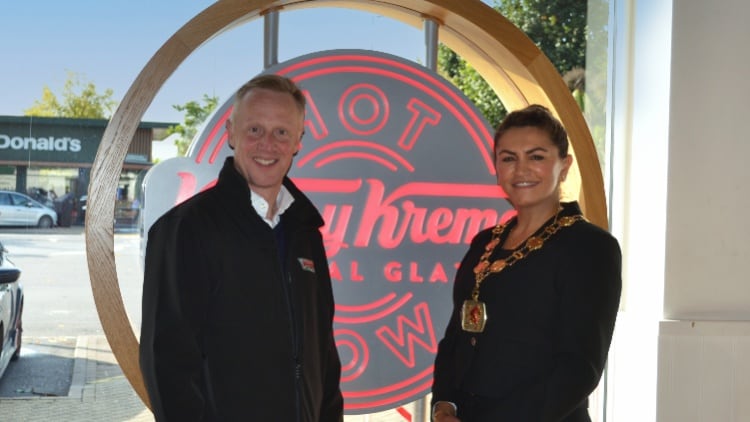The UK arm of Krispy Kreme has grown a sizeable amount over the past 20 years.
This month (October 2023) marked the doughnut maker’s birthday, which it celebrated with a special event in Enfield. To date, its freshly made doughnuts are sold out of dedicated cabinets in 1,600 grocery stores across the country, alongside 127 Krispy Kreme retail stores across the UK, seven ‘hotlight’ kitchens (larger retail stores that produce doughnuts on-site) and its ecommerce platform.
The manufacturer also has 14 retail stores and one hotlight kitchen in Ireland, where it recently celebrated its five-year anniversary.
In a conversation with Food Manufacture, Krispy Kreme UK&I president Jamie Dunning and chief marketing and digital officer Emma Colquhoun discussed the brand’s journey to this point and its goals for the future.
A new dawn, a new day, a new doughnut
With a background working for Mars and Cadbury that spans more than 25 years, Dunning brought a host of experience to the role when he joined Krispy Kreme just over 12 months ago.
Given the nature of his career to date, Dunning explained that Krispy Kreme was such a great fit because he has “always worked for brands associated with giving people a moment of joy”.
Colquhoun, who has spent six years with Krispy Kreme, agreed that joy creation is central to the business’ ethos while reflecting on this latest milestone, describing it as a “great moment”.
“Krispy Kreme created a new category when it launched in the UK in 2003 – a doughnut category just did not previously exist,” she told Food Manufacture. Krispy Kreme was founded in the US in 1937, but Colquhoun said the UK roll-out wasn’t guaranteed to see the same success – it was still a risk.
“Now 20 years on, to be part of a sustainable, successful business that is about joy creation at its heart makes me really proud,” she added.
As it stands, the manufacturer distributes freshly made doughnuts to almost 1,800 locations every day, with each product baked, hand finished and trayed at one of the seven hotlight kitchens or 14 production hubs. From there, a fleet of vehicles completes deliveries throughout the UK.
“Each day we complete drops to our own retail stores and our partner stores, which include Tesco, a partner for the past 20 years, as well as Sainsbury’s, Morrisons and Asda, motorway services and leisure partners,” Dunning explained.
Colquhoun added that such an undertaking is only possible because of the 2,000 “talented and passionate people” that the company employs.
“To do what we do day-in-day-out is what makes our brand so special,” she said.
Being disruptive
Talking about creating joy is all well and good for most brands, but Krispy Kreme has the evidence to back it up. Since entering the UK in 2003 it has scarcely used paid-for marketing to promote its services, instead relying on word of mouth.
Testament to this fact is the support for Krispy Kreme showcased by 2023 Mercury Music Prize winning artist Ezra Collective. The ensemble, who have voiced their fondness for the brand on a few occasions in the past, made an appearance at the Enfield store to mark the celebration, while Mayor of Enfield Suna Hurman was also in attendance.
“We have never advertised through TV or radio, but rely on our fans to spread the word,” said Colquhoun. “We have built a community of people that love the brand and want to talk about it.”
The Lotus Bischoff and Nutty Chocolatta doughnuts are the most popular flavours sold by Krispy Kreme in the UK, while its signature glazed ring is now available in 30 countries around the world. These three form just a small part of its overall collection and the team remains active in creating new, fresh options that “give consumers more reasons to visit”.
“Every four weeks we will do a new branded partnership,” Colquhoun explained. “It is important to be disruptive in how we do things, thinking outside the box and creating new and exciting activations.”
Dunning reiterated this point: “Looking at our different products, we have meaningfully broadened our range of choice in a calorific sense, in terms of price point and in pack size.”
The brand’s overall consumer base incorporates people of all ages, but Gen Z and millennials make up about 60% of its customers. As a result, Krispy Kreme looks to play on trends that best appeal to its core fanbase.
“We look at the US and New York first when investigating trends and then work with our global team to find the branded partners to collaborate on products that have relevance to our audience,” Colquhoun added.
Adapting and thriving
The last few years have brought with them a number of challenges for food manufacturers. Inflation has thinned margins and Covid caused unprecedented disruption to the wider economy.
Looking back on this difficult period, Dunning was pragmatic in his assessment: “The most important thing in business is to realise that it is a game with rules and if you ignore those rules, you lose the game, so we have had adapt.”
Reflecting this philosophy, Krispy Kreme has been quick to adapt to challenges in the past. During Covid, it expanded its availability in grocery settings, which remained open throughout, and introduced a home delivery service and rewards scheme. This allowed the company to thrive coming out of Covid, placing it in a strong position to expand.
Colquhoun elaborated: “We have looked to respond to challenges by driving a smarter and more efficient business and ensuring that any price increases are still worth it for the consumer. The value proposition is supported by the addition of better offers and our rewards programme that create that balance.”
Finding and retaining staff is another challenge that has impacted businesses in all sectors, and the food industry is no exception. Dunning acknowledged that Krispy Kreme has experienced its “share of [employee] turnover in the past 18 months” but he believes that has now stabilised.
“Pay is clearly a baseline for everyone and we have raised our pay rates and have committed to becoming a real living wage employer,” Dunning explained.
“About 56% of our hourly rate employees are paid the living wage already and we will put more into that next year as well.”
Regulations restricting the promotion of products high in fat, salt and sugar (HFSS) have also changed the “rules of the game” for Krispy Kreme, but Dunning is confident that the brand can continue to “grow responsibly” while maintaining respect for the regulations.
“Our products are consumed about three times a year and we are not advocating high frequency consumption,” he said.
“The role we play in wellbeing is in emotional wellbeing because we help to make people’s day two or three times a year. We also offer lower calories doughnuts which taste fabulous and will continue to evolve with our mini and bites range.”
Doubling its reach
Although the 20-year milestone served as a worthy reason to pause and reflect, Dunning and the team have a keen eye set on the future. He revealed that Krispy Kreme is set to open a new factory in the Rochdale area later this year, a facility that he said should prove to be a “showcase of modern manufacturing”.
In addition, Dunning has created a clear vision for what he hopes the brand can achieve over the next five years.
“In our UK journey, we are not even half way there,” he explained. “Today, we only reach about one quarter of the population. I want to make Krispy Kreme more accessible to more people and I think growing from 25% coverage to 50% is achievable.”
Colquhoun agreed that now was not the time for staff to become complacent: “Our awareness in the sweet treats category is 12%, meaning that 88% don’t think about Krispy Kreme. We want to become more top of mind for those moments that matter.”
In other news, learn more about how plant-based frozen ready meal manufacturer allplants carved out a niche.





